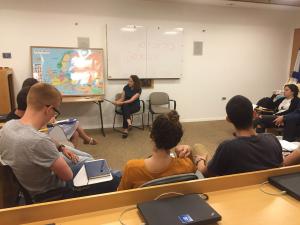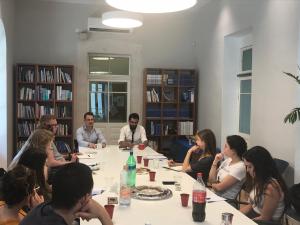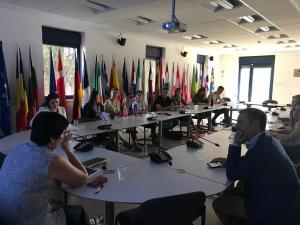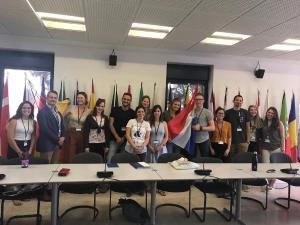The Role of the EU in the Middle East - Foundation Office Israel
Event Reports
What does the future relationship between Israel and the EU look like and how can multilateral ties be further intensified? These questions, raised by students of BGU, were answered by speakers from the Israeli Ministry of Foreign Affairs, representatives of the Konrad-Adenauer-Stiftung and EU-diplomats during the study trip.
The study group had its first stop at the Ministry of Foreign Affairs. After short introductory speeches delivered by several MFA representatives, the ambivalent relationship between the EU and Israel was discussed. Single EU member states and the Federal Republic of Germany in particular still entertain good cultural and economic relations with Israel, despite obvious political disagreement. Israel could potentially play a leading role in EU energy supply through the discovery of massive gas hubs in the East Mediterranean. Germany is still considered to be the "second most important country” after the USA in Israeli society.
After lunch, Dr. Alexander Brakel, head of the KAS office in Jerusalem, and Marc Frings, head of the KAS office in Ramallah, gave a lecture on the work of KAS in the region and their view on Israel-EU-relations. Dr. Brakel highlighted the importance of the EU as a “club of shared values”: closely allied countries outside the European Union are likely to be benchmarked to the EU in terms of democracy and civil rights standards. Frings focused his remarks on the political situation in the West Bank and what efforts the EU currently undertakes to foster the two-state solution. While the Palestinian National Authority seeks to achieve full recognition on an international scale, the internal divide between different political and non-state factions has severely worsened. Especially the lack of good governance as well as corruption and governmental inefficiency lead to a situation where the Palestinian Territories are advancing to become another Arab autocracy and hereby a potential security issue to the EU.
To also give the EU itself the opportunity to be voiced during the study day, the group finally visited the EUs permanent representation (Office of the European Union Representative, West Bank and Gaza Strip, UNRWA) in East Jerusalem. The EU diplomat, Ulrike Hauer, head of the political section, elaborated on the EUs work in the region and especially the situation in Gaza. Mrs. Hauer also critically reflected on the EU´s overall aim of sponsoring a political process between both sides, which has so far turned out to be mostly ineffective. Various contributions during the succeeding discussion showed the high interest of the participants in the question of EU-involvement in the Middle East.
Author: Konstantin Krome






